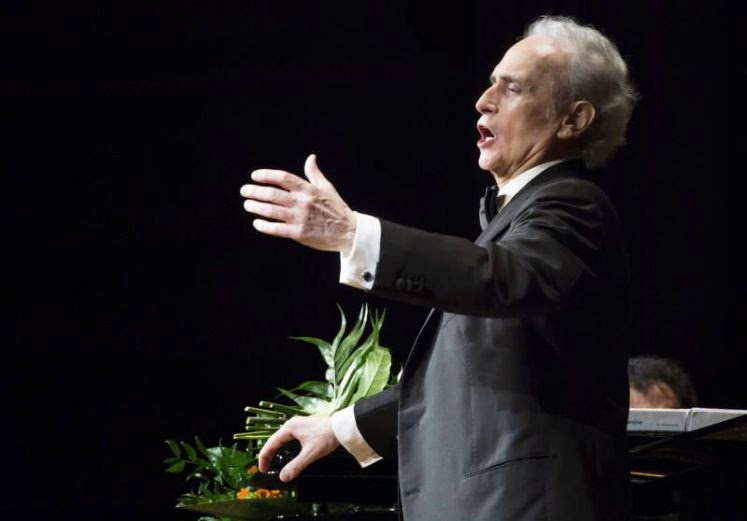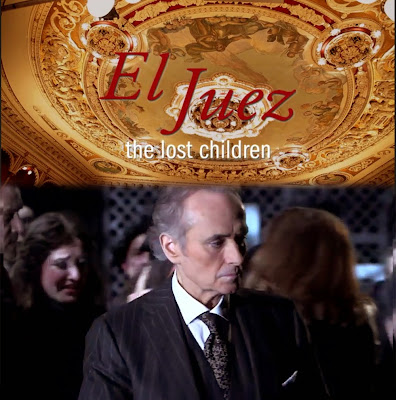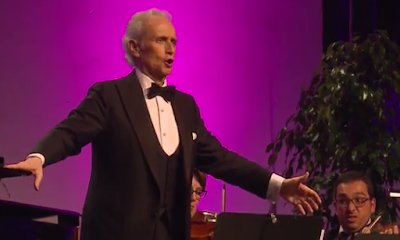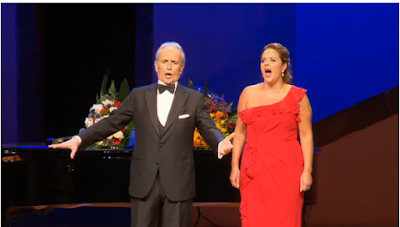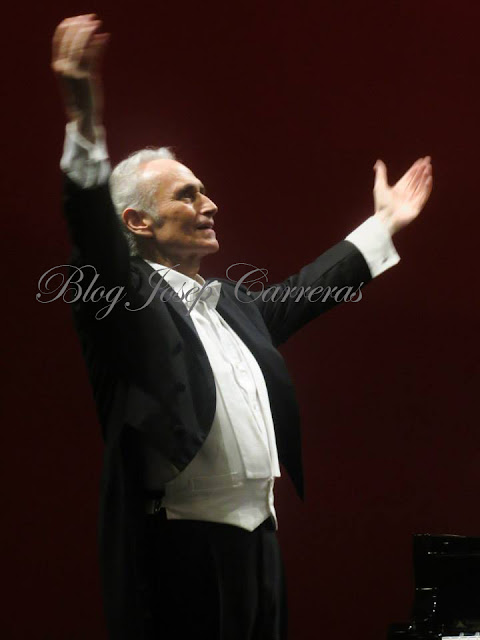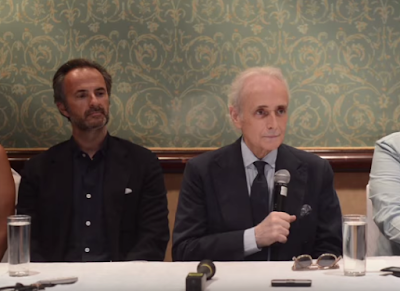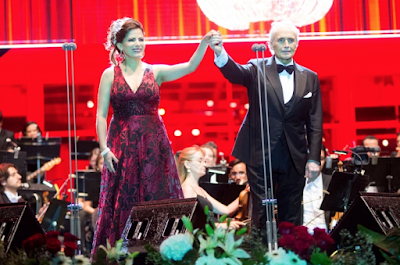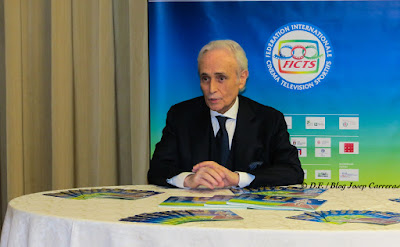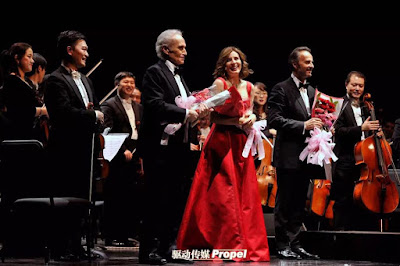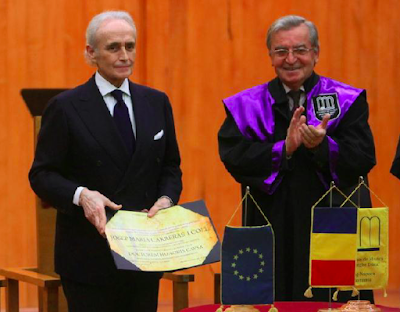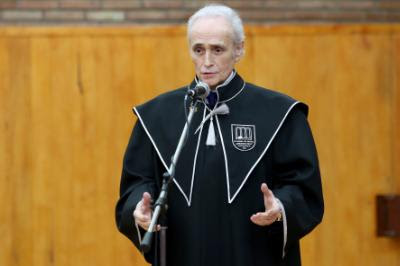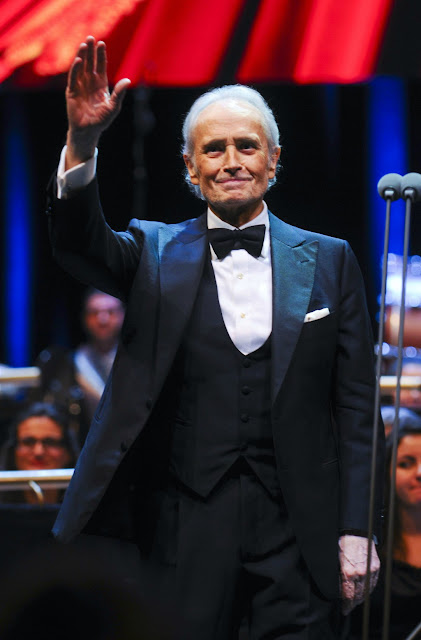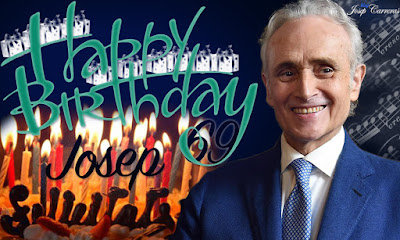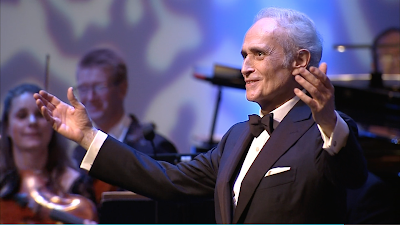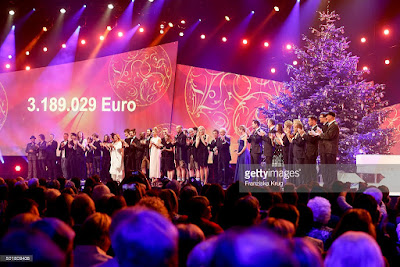Lo scorso sabato 14 marzo Josep Carreras ha offerto uno splendido concerto presso il Cremlino di Mosca, accompagnato dal soprano Venera Gimadieva e dall'Orchestra Sinfonica di Mosca "Russian Phlilarmonie" diretta dal Maestro David Giménez.
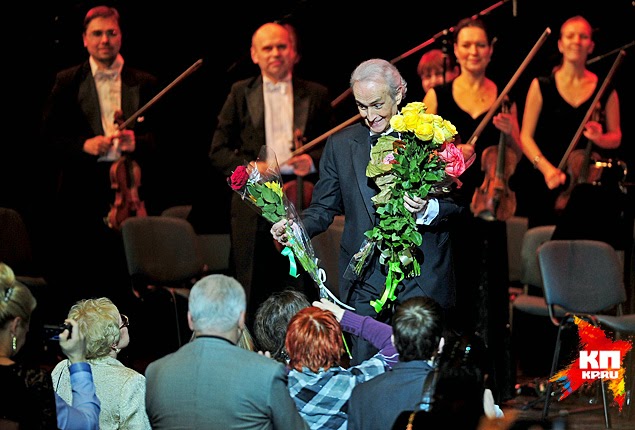 |
| Photo: Михаил ФРОЛОВ - tvkultura.ru |
PRESS
PHOTOS
VIDEO
Durante la conferenza stampa, il tenore aveva affermato di aver composto personalmente il programma, attingendo da vari generi, dall'opera al musical, dalla canzone napoletana alla zarzuela, e così è stato: aveva inoltre anticipato la speranza di continuare a contare con la collaborazione di Venera Gimadieva, una solista del Teatro Bolshoi.
Nella prima parte ha proposto il prediletto Tosti con La Serenata, ma anche un assaggio partenopeo con Pescatore 'e Pusilleco e Fenesta ca lucive, oltre a una nota di patria mediante una sempre irrinunciabile T'estimo. Al soprano, invece, è stato affidata la componente più operistica, con le celebri arie Je veux vivre da Roméo e Juliette di Gounod e Mercé dilette amiche dai Vespri Siciliani di Verdi. I due artisti si sono uniti in un primo duetto con il brano Je te veux di Satie, mentre l'Orchestra si è esibita nell'Ouverture del Nabucco e con un omaggio al paese ospitante, con la Suite no.2 per orchestra jazz di Dmitri Shostakovich. Tuttavia, è stato con il musical, in particolare con la consueta The Impossible Dream da The Man of La Mancha, che il tenore ha concluso la prima parte.
Nella ripresa, a fare da padrone sono principalmente il repertorio napoletano e la zarzuela: Josep Carreras ha interpretato Pecché e Passione, per poi cambiare con la Canción del Gitano da La Linda Tapada di Alonso. Ancora sulla scia della zarzuela, la performance dell'orchestra con l'intermezzo de La Boda de Luis Alonso, ed il primo dei due duetti, il celebre Dúo y Jota de La Africana di Jiménez. Venera Gimadieva è stata invece incaricata delle interpretazioni de Il Bacio di Arditi e Les filles de Cadix di Delibes. Straordinaria chiusura con Torna a Surriento, in versione di duetto.
Al grande entusiasmo del pubblico ha corrisposto una lunga sequenza di bis, tra cui Chitarra Romana e Vierno, magistralmente interpretati da Josep Carreras e Non ti scordar di me insieme al soprano, che a tratti potete ascoltare nel video che trovate in alto. Le immagini ritraggono inoltre il nostro tenore letteralmente sommerso da una moltitudine di mazzi di fiori, una nota di colore che, insieme agli interminabili applausi, si sposa pienamente con il nome dell'evento: "Grazie, Mosca!".
BRAVO, JOSEP!!!
 |
| Photo: Михаил ФРОЛОВ - tvkultura.ru |
ENGLSH
Last Saturday, 14 March, Josep Carreras offered a wonderful concert at the Kremlin Palace in Moscow, together with soprano Venera Gimadieva and the Moscow Symphony Orchestra "Russian Phlilarmonie" conducted by David Gimenez.
During the press conference, the tenor had already revealed in advance that he had personally made up the program, drawing from various genres, from opera to musical, from the Neapolitan song to zarzuela, and so he did: he also talked about the hope to keep working with Venera Gimadieva, a soloist of the Bolshoi Theatre.
In the first part of the concert he started with Tosti's La Serenata, and also with a taste of Naples with Pescatore 'e Pusilleco and Fenesta ca lucive, plus a touch of his homeland with a lovely choice, such as T'estimo. On the other side, the soprano was entrusted the opera repertoire, with the famous aria from Gounod's Roméo and Juliette, Je veux vivre, and Mercé dilette amiche from Verdi's I Vespri Siciliani. The two artists joined in a first duet with the Satie's song Je te veux, while the orchestra performed firstly with Nabucco's Ouverture, and then with a tribute to the host country, the Jazz Suite, Waltz no.2 by Dmitri Shostakovich. However, it was with the musical, in particular with The Impossible Dream from The Man of La Mancha, that the tenor closed the first part.
In the second half, the main feature are the Neapolitan repertoire and zarzuela: Josep Carreras opened with Pecché and Passione, to continue than with Canción del Gitano from Alonso's La Linda Tapada. Still in the wake of the zarzuela, the orchestra performed the intermezzo from La Boda de Luis Alonso, in addition to the first of two duets, the famous Dúo y de La Jota from Jiménez's La Africana. Venera Gimadieva was responsible of the interpretations of Arditi's Il Bacio and Délibes' Les filles de Cadix. At the end, an xtraordinary closure with Torna a Surriento, in a duet version.
The enthusiasm of the public was rewarded with a long sequence of encores, including Chitarra Romana and Vierno, which means two masterful rendition by Josep Carreras, and then Non ti scordar di me together with the soprano. You can find short excerpts of these three songs in the video link at the top of the post. The photos also portray our tenor literally showered by a multitude of bunches of flowers, a lovely detail that, along with endless ovations, fully matches with the name of the event: "Thank you, Moscow!".
